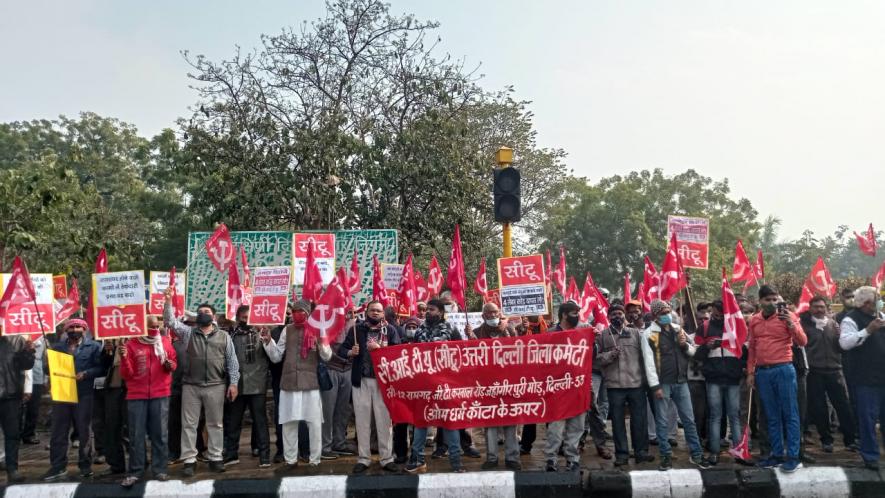Trade Unions March in Delhi, Urge AAP Govt Not to Implement Labour Codes

State unit of CITU carried out a march to Delhi Secretariat. Image clicked by Sumedha Pal
New Delhi: Amid heavy police presence, workers led by Centre of Indian Trade Unions (CITU) marched in the national capital on Thursday, pressing the Aam Aadmi Party (AAP) government in Delhi to not implement the labour codes. Subsuming the existing 29 central labour enactments, the codes are feared to dilute the regulations relating to the retrenchment process among others.
Touted as “reforms” by the Narendra Modi-led central governemnt, the four labour codes are scheduled to be implemented across the country latest by April this year; the tripartite consultations to finalise the code rules were completed last month despite resistance from the trade unions.
The ten Central Trade Unions had boycotted the two rounds of virtual tripartite meeting, describing it as a “farce”, and instead had demanded for a consultation exercise in which the physical presence of the stakeholders was allowed.
On Friday, state unit of CITU carried out a march to Delhi Secretariat, which started from Shaheed Bhagat Singh park near ITO metro station in the morning. The march, that was barricaded by Delhi Police in between the route, saw participation of over 200 workers, along with union members.
A similar march was also called back in November last year.
The demand to the AAP government in Delhi to not implement the codes came after multiple protests were staged to thwart the process of codification of the labour legislations altogether, but to no avail.
Labour falls under the concurrent list of the Constitution and as such both the Parliament and state legislatures can make laws relating to it.
The Code on Wages, 2019, was passed by the Parliament in 2019, while the other three codes were referred to the Standing Committee on Labour. Subsequently, the Code on Social Security, Industrial Relations Code and Occupational Safety, Health and Working Conditions Code were passed by the Centre last year in September.
While experts have maintained that the labour codes will take us back to the 19th century, hinting that numerous “pro-labour” legal achievements over the period will be lost, the unions oppose the introduction of “fixed term employment” across industries.
Workers, left with no wage guarantee, will be retrenched at any point, Anurag Saxena, general secretary, CITU – Delhi NCR, told NewsClick on Thursday. He added that “the fundamental right of the workers to unionise, the essential tools that workers need to fight oppression at their workplaces” will be taken away.
“The provisions of an eight-hour work day, permanent employment, and labour rights were achieved after a prolonged struggle. The [central] government is attacking these provisions and introducing fixed term employment that will push us centuries back,” Saxena said. “We urge the state government of Delhi to not implement the codes here [in Delhi].”
Kamla Devi, another CITU leader who has been active among the Anganwadi workers, said that the so called reforms proposed by the government are a “way to promote capitalist and business interests at the cost of the workers’ rights.”
She said, “The worst affected will be the working class women. The wage disparity between men and women will be widened.”
Dinesh Kumar, a worker in Delhi Jal Board (DJB) for the last 22 years, who claimed to have been engaged in distribution of water across old Delhi, said the effects of the labour codes were already “visible on the ground”, even though they are yet to be implemented. “Hundreds of us [the workers] have been fired,” he said, suggesting that the situation will only worsen.
Saying that they are protesting today to safeguard workers’ rights, Kumar added: “There will be no job security and no proper wages. The workers will be completely exploited and that is why we are fighting the implementation of these codes in Delhi.”
Get the latest reports & analysis with people's perspective on Protests, movements & deep analytical videos, discussions of the current affairs in your Telegram app. Subscribe to NewsClick's Telegram channel & get Real-Time updates on stories, as they get published on our website.
























